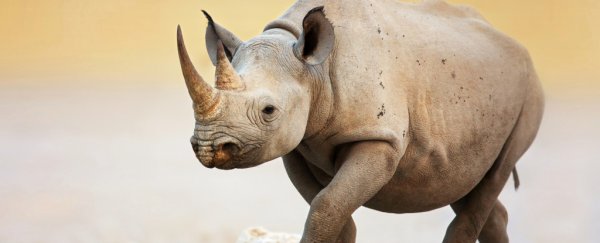A high court judge has upheld a decision to lift the ban on buying and selling rhino horn within South Africa. Rhino horn trade has been outlawed in the country since 2009, and internationally since 1977, but if the high court's decision holds up against an appeal, that could all be about to change.
Ironically, the move came just days after the news that rhino deaths in South Africa had declined in 2015, for the first time in eight years. Rhino farmers who are pushing to have the ban lifted argue that establishing a legal supply will reduce demand for poachers, but conservationists think it'll just put more pressure on the endangered species.
Right now, there are only 29,000 rhinos left on the planet, most of which are in South Africa. It's an incredible drop from the 500,000 that roamed Earth at the start of the 1900s, and sadly, the majority have been killed as a result of poaching, which increased 9,000 percent (yes, you read that right) between 2007 and 2014.
That means more than 1,000 rhinos are now killed illegally each year for their horns. Most of these end up in Asia, where they can reach up to US$100,000 per kilogram on the black market. Those prices are driven by the fact that many countries see rhino horn as a status symbol, and in Vietnam it's believed (with no evidence whatsoever) to cure cancer.
National park rangers have tried everything to put an end to poaching - from drone surveillance to spy cameras. They've even started guarding the last male northern white rhino 24/7 in an attempt to keep him safe.
But despite these efforts, and the very small decline in deaths recorded last year in South Africa, the demand remains. And in Kruger National Park, twice as many rhinos are still being killed than can be replaced through natural reproduction. Some experts say that if we continue down this path, rhinos will be gone by 2020.
The push to lift the ban on selling rhino horn came from game breeders, John Hume and Johan Kruger, who claim that legalising the trade within the country will reduce rhino deaths - rhino horn is similar to our fingernails, and can actually be harvested without harming the animal. Hume also argued that if the ban on rhino trade continued, he'd no longer be able to afford to keep his 1,200 farmed rhinos.
But there's a big problem with their argument, and that's the fact that pretty much all of the demand for rhino horn comes out of Asia - and lifting the ban on being able to sell within South Africa isn't going to do anything to stop that.
"It is inconceivable that anyone would buy it - unless they intend to sell it abroad illegally or they are speculating that international trade will be legalised," said the World Wildlife Fund in a statement.
In fact, if the ban is lifted, it'll probably just create a new market for rhino horn, and put more pressure on the already endangered species.
"Amid a rhino-poaching crisis and increased international efforts to reduce demand for rhino horn, this ruling will do nothing whatsoever to protect rhinos, and only serves to benefit those parties with vested interests who seek to commodify rhino horn, and who stand to profit greatly as a result," Teresa Telecky, wildlife director for Humane Society International, told The Wall Street Journal.
The South African Department of Environmental Affairs will now appeal the decision in the Supreme Court of Appeals, which means the ban will stay in place for a few more months until that court reaches a decision.
Unfortunately the long-term prospects aren't looking good - South Africa has also announced that it would like to discuss whether lifting the international ban on horn trade might also help curb poaching.
Rhinos, it's been nice sharing the planet with you.
